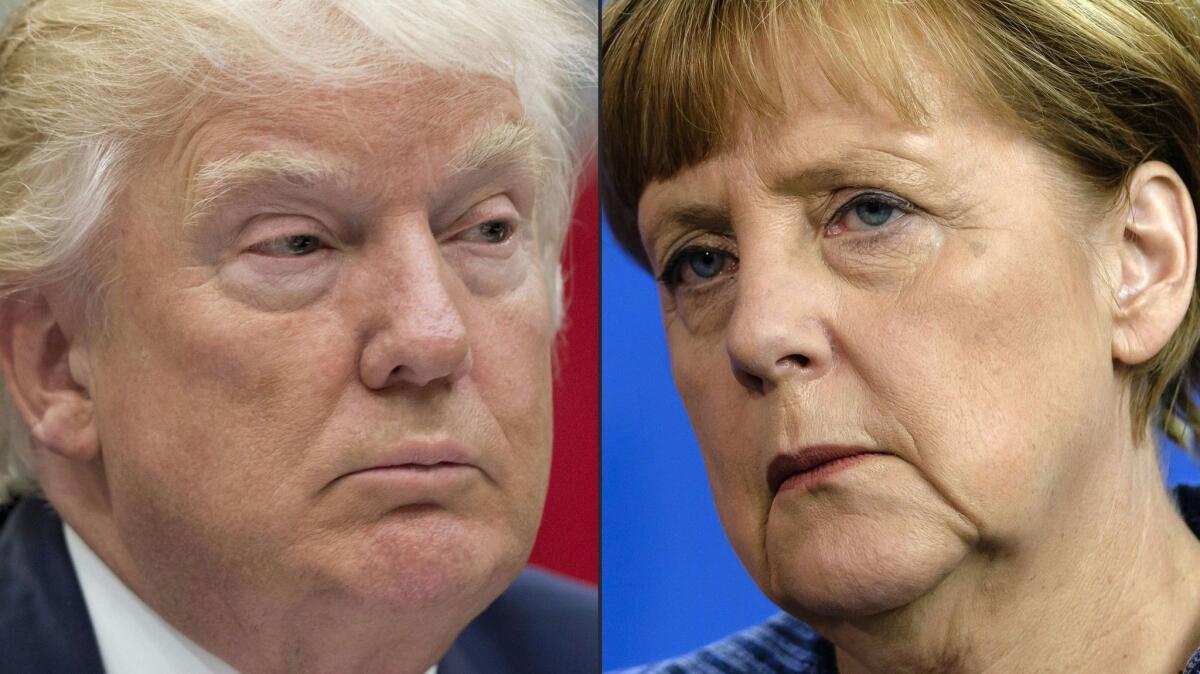Strained U.S.-German ties and Russia in focus as Trump plans first meeting with Merkel

After more than a decade in office, German Chancellor Angela Merkel has become the most important American ally in continental Europe and the region’s most powerful leader by far.
As a presidential candidate, Donald Trump derided Merkel’s open-arms refugee policy as a “disaster,” questioned her trustworthiness and threatened to impose import penalties on German car makers.
In style and substance, the two leaders — one hot-tempered and confrontational, the other unflappable and detail-oriented — could not be more different. On policy, they disagree on immigration and refugees, a resurgent Russia, global trade deals and the European Union.
On Friday, President Trump will welcome Merkel to the White House for their first sit-down summit in what both sides see as a chance to seek common ground and restore stability in trans-Atlantic relations.
“The stakes for this meeting, … and for this relationship even more so, are very high,” said Heather Conley, Europe program director at the nonpartisan Center for Strategic and International Studies in Washington.
But she said expectations are low for the meeting, which was postponed until Friday after a snowstorm hit the East Coast.
“I’m not even sure expectation is the right word,” Conley said. “We have to think about these things as managing through a fairly turbulent moment [in the U.S.], trying to begin to establish that relationship and framework and setting down a clear set of markers of values and principles.”
The two are expected to discuss strengthening the NATO military alliance, collaborating in the fight against terrorism and Islamic State, and taking steps to resolve the conflicts in Syria and Ukraine, where Russia has intervened.
Merkel, who has been chancellor since 2005, has met with Russian President Vladimir Putin more often than any other foreign leader, and U.S. officials believe she has more than held her own.
A senior Trump administration official, who briefed reporters last week on condition of anonymity, said Trump “will be very interested in hearing the chancellor’s views on her experience interacting with Putin … very interested in hearing her insights and what it’s like to deal with the Russians.”
Previous U.S. administrations have viewed Germany as a bulwark against Russian aggression in an increasingly troubled Europe, and the glue that holds together U.S.-European sanctions against Moscow following its 2014 seizure of Crimea.
After Trump appeared to suggest he might ease sanctions on Russia, German Defense Minister Ursula von der Leyen publicly warned Washington at last month’s Munich Security Conference, with Vice President Mike Pence and Defense Secretary James Mattis in attendance, not to attempt to forge a separate deal with Moscow.
Administration officials have since said sanctions would remain in place.
On trade, the United States has a trade deficit with Germany, its largest trading partner in Europe. The Trump administration has accused Germany of gaining unfair trade advantages through a weak euro.
The two leaders have clashed on spending for the North Atlantic Treaty Organization, the military alliance created to counter Soviet advances during the Cold War and now used to help fight the Taliban in Afghanistan and to block Russian pressure in Eastern Europe.
Senior administration officials last week said they were encouraged that Germany had agreed to boost its annual defense spending by more than 5% to $39 billion.
But German defense spending is still below the NATO target of 2% of annual economic output. The U.S. spent about 3.6% of gross domestic product on defense last year, and Trump wants to boost it by $54 billion, or 10%.
Merkel’s visit to Washington comes at a tumultuous time in Europe.
Following Britain’s referendum in June to withdraw from the European Union, regional agreements are in danger of unraveling, and nationalist populist parties have gained new currency in several countries.
In the Netherlands, Geert Wilders, leader of a far-right Freedom Party, surged in the polls after he called for shuttering mosques and closing borders to refugees and immigrants from Islamic countries. But in national elections Wednesday, Prime Minister Mark Rutte’s center-right party won the largest share of the votes.
In France, a political shakeup appears likely after elections that begin on April 23. Top establishment candidates have dropped out, leaving radical nationalist leader Marine Le Pen among the three remaining contenders.
In England, Prime Minister Theresa May won a parliamentary battle this week to start the so-called Brexit talks, a move likely to damage the British economy and European unity. And Scottish leader Nicola Sturgeon called for a new referendum on Scottish independence, which could dismember Great Britain.
Putin has evinced support for Le Pen in France, as well as for the German nationalist party that could complicate Merkel’s attempt to win a fourth term as chancellor in September.
All these developments have thrust Europe into uncertain territory, with the added unknown of an unpredictable U.S. administration.
For more on international affairs, follow @TracyKWilkinson on Twitter
More to Read
Sign up for Essential California
The most important California stories and recommendations in your inbox every morning.
You may occasionally receive promotional content from the Los Angeles Times.











